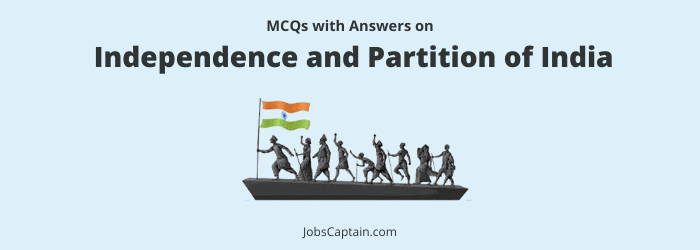
| Test | 1 | 2 |
| Return to | Topic Wise MCQ on Indian National Movement (1885 to 1947) | |
Question 1. The British Government decided and declared to leave India by June, 1948 in________.
(A) June, 1947
(B) April, 1947
(C) February, 1947
(D) 1946
Question 2. The British Monarch at the time of Indian Independence was________.
(A) George V
(B) King Edward VII
(C) George VI
(D) None of the above
Question 3. Which one of the following parties was in power in U.K. when India got independence?
(A) Socialist Party
(B) Liberal Party
(C) Labour Party
(D) Conservative Party
Question 4. Who was the Prime Minister of England when India attained independence?
(A) Winston Churchill
(B) Harold Mc Millan
(C) Clement Attlee
(D) None of the above
Question 5. Lord Mountbatten came to India as a Viceroy alongwith specific instruction to________.
(A) Persuade the Congress to accept partition
(B) Accept Jinnah’s demand for Pakistan
(C) Keep India United if possible
(D) Balkanize the Indian sub-continent
Question 6. Which plan became the platform of Indian Independence?
(A) Cripps Plan
(B) Mountbatten Plan
(C) Wavell Plan
(D) None of the above
Question 7. The Mountbatten Plan became the basis for______.
(A) Solution of communal problems
(B) Partition of the country
(C) Transfer of power
(D) Continuity of British Rule
Question 8. Mountbatten Plan (June 1947) provided for a referendum in which of the following province(s)?
(A) All of the below
(B) North-West Frontier Province
(C) Baluchistan
(D) Sindh
Question 9. The British Parliament passed the Indian Independence Act in_________.
(A) August, 1946
(B) August, 1947
(C) July, 1947
(D) January, 1947
Question 10. The Indian Independence Act, 1947 came into force on_______.
(A) 14 August, 1947
(B) 18 July, 1947
(C) 10 July, 1947
(D) 4 July, 1947
Question 11. The formula for transfer of sovereignty to India in 1947 was known as________.
(A) Wavell Plan
(B) Mountbatten Plan
(C) Morely-Minto Reforms
(D) Durand Plan
Question 12. ‘Mountbatten Plan’ regarding the partition of India was officially declared on_______.
(A) 03 June, 1947
(B) 03 July, 1947
(C) 10 June, 1947
(D) 04 June, 1947
Question 13. The Indian Independence Bill received the Royal Assent on_________.
(A) 21st July, 1947
(B) 20th July, 1947
(C) 19th July, 1947
(D) 18th July, 1947
Question 14. The Balkan Plan for fragmentation of India was the brain child of_________.
(A) V.P. Menon
(B) Lord Mountbatten
(C) M.A. Jinnah
(D) W. Churchill
Question 15. The Indian National Congress agreed in 1947 to the partition of the country mainly because_________.
(A) India would have otherwise lost the opportunity to attain freedom
(B) They wanted to avoid largescale communal riots
(C) It was imposed by the British Government and the Congress was helpless in this regard
(D) The principal of Two-nation Theory was then acceptable to them
Question 16. Which of the following assumed sovereign power at midnight of 14/15 August, 1947 provisionally?
(A) Chamber of Princes
(B) Interim Government
(C) Constituent Assembly
(D) Central Legislative Assembly
Question 17. In the meeting of All India Committee on 14 June, 1947; who among voted against the partition of India?
(A) Govind Ballabh Pant
(B) Sardar Patel
(C) Khan Abdul Gaffar Khan
(D) Abul Kalam Azad
Question 18. Who presided over the Delhi Session of Indian National Congress in 1947?
(A) Jawaharlal Nehru
(B) Abul Kalam Azad
(C) Rajendra Prasad
(D) J.B. Kripalani
Question 19. Who of the following took the passing of a resolution on the partition in the meeting of the Congress Committee (1947) as a ‘Surrender of Nationalism in favour of Communalism’?
(A) G.B. Pant
(B) Jawaharlal Nehru
(C) Purushottam Das Tandon
(D) Dr. Kitchlew
Question 20. Who among the following had seconded the resolution on the partition in the meeting of All India Congress Committee held in New Delhi in 1947?
(A) Abul Kalam Azad
(B) J.B. Kripalani
(C) Sardar Vallabhbhai Patel
(D) Govind Ballabh Pant
Question 21. Who among the following was the Chairman of the Congress Session of Delhi wherein resolution of divided India was passed on 14 June, 1947?
(A) Jawaharlal Nehru
(B) Acharya J.B. Kripalani
(C) Vallabhbhai Patel
(D) Rajendra Prasad
Question 22. The last opportunity to avoid the partition of India was lost with the rejection of_______.
(A) Wavell Plan
(B) Cabinet Mission
(C) Rajagopalachari Formula
(D) Cripps Mission
Question 23. Who headed the Boundary Commission appointed in 1947 in the context of India’s partition?
(A) Richardson
(B) James Bolt
(C) Radcliffe
(D) Mountbatten
Question 24. The Radcliffe Committee was appointed to_________.
(A) Enquire into the riots in East Bengal
(B) Demarcate the boundaries between India and Pakistan
(C) Give effect to the Independence Bill
(D) Solve the problem of minorities in India
Question 25. As an alternative to the partition of India, Gandhiji suggested to Mountbatten that he_______.
(A) Invite the army to take over for sometime
(B) Invite Nehru and Jinnah to form the Government together
(C) Invite Jinnah to form the Government
(D) Postpone granting of independence
| Test | 1 | 2 |
| Return to | Topic Wise MCQ on Indian National Movement (1885 to 1947) | |
